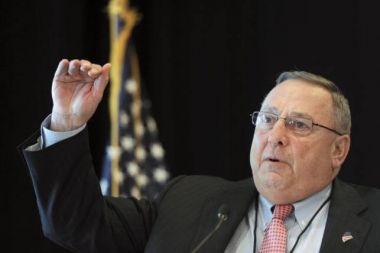Controversial U.S. governor wants to bring back guillotine to execute drug traffickers

Maine Governor Paul LePage wants to use a medieval method of executing drug traffickers in the state.
During a radio interview with WVOM-FM Tuesday, LePage suggested reviving and using the guillotine against hardened and heinous criminals.
"What we ought to do is bring the guillotine back. We could have public executions and we could even have which hole it falls in," he said, according to NBC News.
Guillotine was the main method of execution in France during the French Revolution and was used until 1977.
LePage also said that "I think the death penalty should be appropriate for people that kill Mainers." Maine abolished the death penalty in 1887.
His office said Tuesday that his remarks were a joke to show his support for tougher penalties against drug crimes, the Associated Press reported.
During the radio interview, LePage added, "We've got to go 20 years, we've got to keep them here until they die. If you want my honest opinion, we should give them an injection of the stuff they sell."
Earlier this month, LePage was criticised for being racist when he talked about drug dealers coming to Maine.
"These are guys with the name Dee Money, Smoothie, Shifty. They come up here, they sell their heroin, then they go back home. Incidentally, half the time they impregnate a young, white girl before they leave, which is a real sad thing because then we have another issue that we got to deal with down the road," he said.
Alison Beyea, executive director of the American Civil Liberties Union of Maine, wrote in Bangor Daily News that LePage was referring to blacks.
"LePage suggested that Maine's drug problem is being driven by black people from away rather than by inadequate drug treatment resources here in Maine," she wrote.
The governor also faced a threat of impeachment in the Maine House this month for allegedly using his power to coerce organisations and his refusal to allow administration officials to testify before House proceedings.
The bill that would create an investigative committee to probe LePage failed to pass.











